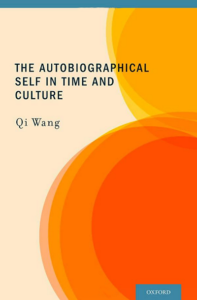Member Publications
The Autobiographical Self in Time and Culture

Author(s) Wang, Qi
2013, Oxford
Tags Developmental, Social
Price USD75 | Pages 240 | ISBN 978-0199737833
In this volume, Qi Wang traces the developmental, social, cultural, and historical origins of the autobiographical self – the self that is made of memories of the personal past and of the family and the community. Wang combines rigorous research, sensitive survey of real memories and memory conversations, and fascinating personal anecdotes into a state-of-the-art book. As a “marginal woman” who grew up in the East and works and lives in the West, Wang’s analysis is unique, insightful, and approachable. Her accounts of her own family stories, extraordinarily careful and thorough documentation of research findings, and compelling theoretical insights together convey an unequivocal message: The autobiographical self is conditioned by one’s time and culture.
Beginning with a perceptive examination of the form, content, and function of parent-child conversations of personal and family stories, Wang undertakes to show how the autobiographical self is formed in and shaped by the process of family storytelling situated in specific cultural contexts. By contrasting the development of autobiographical writings in Western and Chinese literatures, Wang seeks to demonstrate the cultural stance of the autobiographical self in historical time. She examines the autobiographical self in personal time, thoughtfully analyzing the form, structure, and content of everyday memories to reveal the role of culture in modulating information processing and determining how the autobiographical self is remembered. Focusing on memories of early childhood, Wang seeks to answer the question of when the autobiographical self begins from a cross-cultural perspective. She sets out further to explore some of the most controversial issues in current psychological research of autobiographical memory, focusing particularly on issues of memory representations versus memory narratives and silence versus voice in the construction of the autobiographical self appropriate to one’s cultural assumptions. She concludes with historical analyses of the influences of the larger social, political, and economic forces on the autobiographical self, and takes a forward look at the autobiographical self as a product of modern technology.
